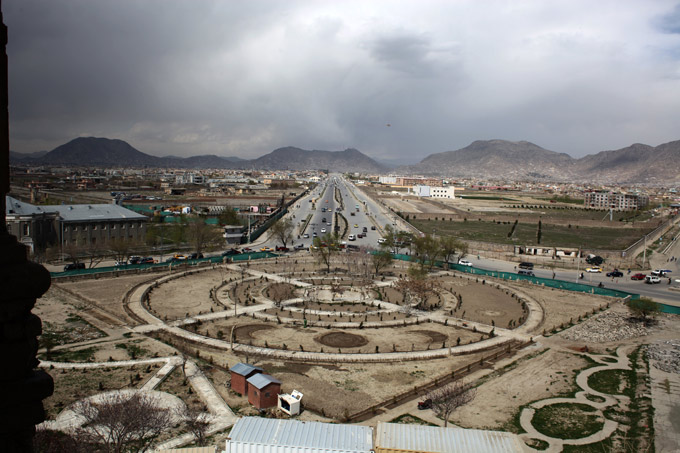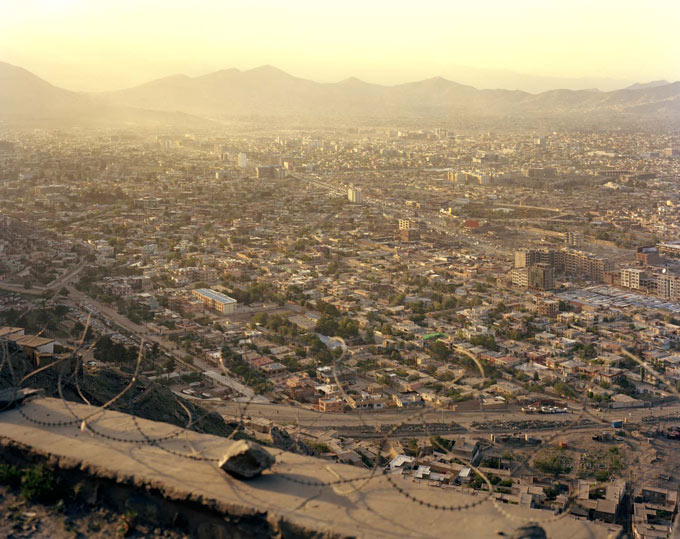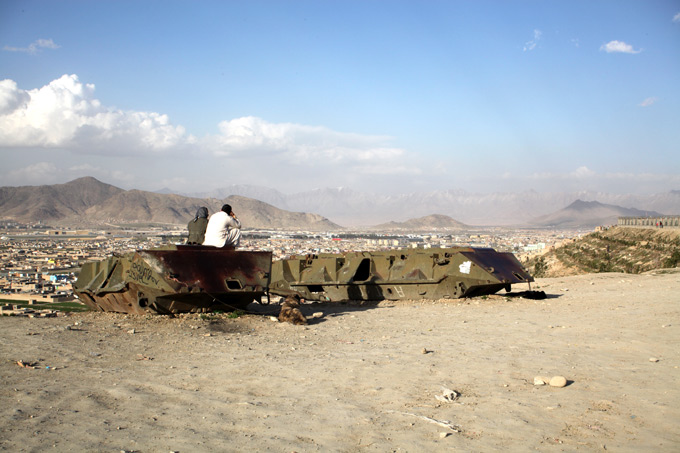
The road to Kabul as seen from a window in Darulaman Palace. Photo by Lisi Raskin, 2013.
The day before the Taliban took Kabul, I was on the back of my father’s bicycle watching a mass exodus from the city. In the northern neighborhood where my father owned a small shop, tens of thousands of women and children were crammed into Russian trucks, big and small, rushing toward Panjshir Province. And in western Kabul, families of the mostly Shia Hazara ethnic group—oppressed throughout our history by Sunni Pashtun kings and emirs—were leaving the city for Hazarajat, fearing persecution by the Sunni Taliban. For my family, though, there was a sense of excitement about a group we had heard much about but had never seen.
We dreamed that the Taliban’s arrival signaled an end to the bloody atrocities of the mujahidin warlords who had carved up Kabul and ruled by the gun. After enduring carnage and chaos for years, we were enamored of the tales of peace our family and friends who lived in Taliban-controlled areas told.
In Afghanistan, wisdom is measured by the number of regimes one has lived to see.
Still, the civil war that had been raging since 1992, which instilled both a sense of futility and cynicism toward every political faction, gave us good reason to be nervous. Accustomed to years of going to sleep under the rule of one militant group and waking up to the dominance of its rival, we slept that night like we did every other night—desperately hoping the next day would bring something better.
At 6 o’clock the following morning, my brother and I awoke to my mother announcing that the Taliban had taken Kabul. It was not long before we were among the men, women and children dashing into our neighborhood square in anticipation of their arrival. Walking through the crowd, we saw pistols, AK-47s, bullet boxes and grenades lying on either side of the street. People had disposed of what weapons they possessed, having heard about the Taliban’s strict gun control policies.
When we reached the square, everyone was trying to get closer to the main road for a better view. Some men put their children on their shoulders as the crowd pressed together. A voice cried out from the far end of the square, announcing that the Taliban had arrived. Other voices joined in loudly. I looked toward the east and spotted pickup trucks approaching.
A few seconds later we could see the Taliban’s large white turbans, loose-fitting piran tombans (traditional Afghan clothes) and black beards. Some held fast to their loaded RPG launchers while others rested their AK-47s on their laps. The crowd encircled them and walked slowly behind the long convoy of trucks, throwing heaps of money and flowers on the soldiers.
We followed the trucks for some time, but as they sped away into the distance, we decided to return home. It was 7:30AM, and the BBC Pashto—our constant companion throughout the civil war—officially announced the capture of Kabul by the Taliban.

Kabul, Afghanistan, seen from “TV Mountain.” Photo by Leon Chew, 2011.
The broadcast also revealed news that would shake the entire city. The Taliban had murdered Dr. Najibullah Ahmadzai, the last Communist president of Afghanistan, along with his brother.
Under the cover of night, a group of Taliban commandos had entered the city with a single purpose: to execute the former president, whom they loathed, because he was a Communist with strong anti-Pakistan views. Najibullah had taken refuge as a political prisoner in the United Nations compound near the presidential palace when his government collapsed in 1992. But the compound was unguarded, and the Taliban easily broke in.
After killing him, the commandos dragged Najibullah’s corpse to the presidential palace. There they took the former president, known to his enemies as Gaw (“the bull”), and castrated him. His disfigured corpse was hung from a traffic post in Ariana Square.
Compelled to see this dreadful deed with our own eyes, my brother and I rushed out of the house again. By the time we arrived at the square, tens of thousands of people had gathered there.
With every invasion, assassination, coup or election, I have become wary of transition; experience has taught me that what we’ve seen is more important than what we hope will come.
I can still vividly recall Najibullah’s fleshy hands pounding on the table as he delivered the fiery speeches warning citizens about the mujahidin and other extremists that would become his trademark and later drive him to infamy. In death, he was almost unrecognizable. An aged man, he had lost much of the bulk that made his physique striking. Where his dark black hair once stood was a gaping hole in his head, into which bees and flies would disappear, only to emerge seconds later. The Taliban had stuffed Pakistani and American banknotes in his nostrils. In his hands they had placed an unlit cigarette.
The silence of the shocked crowd was interrupted by a group of young Taliban fighters dancing as AK-47s hung from their shoulders. “God is great! Long live Islam!” they shouted in unison. They were joined by a lone elderly, bearded Pashtun man, who cursed and spit at Najibullah’s hanging body.
As we left Ariana Square, I looked back at the dejected expressions on people’s faces. We trudged away in silence and disbelief. The jubilation that accompanied the Taliban’s arrival had not lasted long.

Two men sit on top of Soviet tanks overlooking Kabul from “Swimming Pool Hill.” Photo by Lisi Raskin, 2013.
In Afghanistan, wisdom is measured by the number of regimes one has lived to see. At 30, I have already witnessed four presidents and one emir take power, have seen my nation as a republic and as an Islamic state and have watched NATO troops, mujahidin and Taliban militants march through Kabul. With every deposed leader, assassination, invasion, coup or election, I have become wary of transition; experience has taught me that what we’ve seen is more important than what we hope will come.
Today, as presidential elections approach and American soldiers withdraw after more than a decade of war, worry mingles with excitement as it has before. We can only hope that this transition brings a better future than the one the Taliban carried into Kabul that day 18 years ago.

